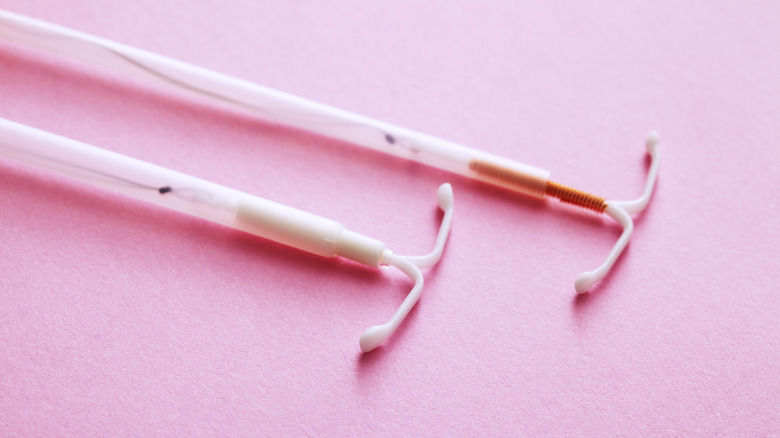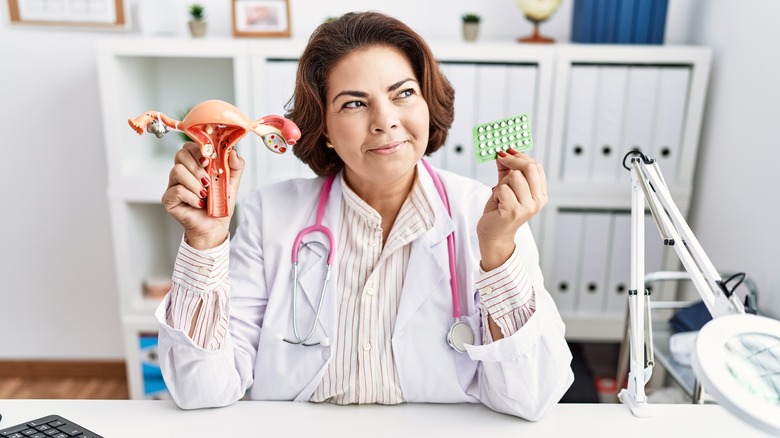Does An IUD Have Any Effect On Your Sex Drive?
Little pink pills, flexible clear rings, and latex rubbers are only a handful of the available contraception options your doctor might've pitched to you (per Planned Parenthood). If you're able to get pregnant, experience periods, or are sexually active, it's likely that you've given some thought to these various forms of birth control.
Even though contraception access and awareness are vital elements of comprehensive healthcare, birth control options can still be a murky area for those who are interested in or currently use them (via ACOG). IUDs, or intrauterine devices, are one example of a birth control method available to those with uteruses.
As mentioned by Planned Parenthood, these T-shaped contraception devices are inserted into the uterus and serve as a long-term and reversible form of pregnancy prevention. With a 99% effectiveness rate, it's one of the most successful forms of birth control.
Just like most forms of contraception, the functionality of IUDs goes beyond preventing pregnancy. Out of the two types of this contraception, hormonal and copper, hormonal IUDs can help with period symptoms, such as heavy bleeding and period cramps, and are sometimes used to treat endometriosis and PCOS (per Planned Parenthood).
When considering what type of birth control is best for you, it's important to know all the potential benefits and side effects. With some hormonal birth control users reporting a decrease in libido or sex drive (per Clue), you may be wondering if IUDs can have a similar effect. However, the truth may surprise you.
How IUDs and sex drives are potentially related
The relationship between libido and any form of contraception can be a little tricky, as sex drive can be affected by many external factors, such as certain libido-boosting foods, and several of the potential side effects of birth control (via Clue). For example, if using latex condoms results in physical irritation, then the user's experience with and therefore desire to have sex can be negatively impacted, according to Healthline.
Similarly, some IUD users have reported an increased sex drive, but not because of any direct influence the device seems to be having on the body, Glamour noted. As explained on Blue Heart, hormonal IUDs differ from other types of hormonal birth control in that the hormone it releases — progestin — is localized to the uterus, minimizing the overall effect it has on the body.
Copper IUDs use the copper coating of the device rather than hormones to prevent pregnancy, so it doesn't influence bodily hormones as some hormonal contraceptives do. Knowing how the two types of IUDs work, you may be wondering how exactly they have any impact on an individual's sex drive.
The truth is, you might feel an increase in sex drive after having an IUD inserted because you don't have to worry about an unplanned pregnancy (per Glamour). While IUDs do not protect against STDs, their high effectiveness rate and low maintenance can make your sex life much more enjoyable.
Consult your doctor if you have questions about contraception
While the internet can provide some very valuable resources about birth control, everyone's experience with contraception is individual, so it's important to talk to your doctor if you have questions about your experience or your options (per Theramex).
If you're unsure how to begin the conversation about birth control with your primary care physician or gynecologist, then there are a few tips that can help you prepare. As mentioned by Very Well Health, conducting research and noting any questions you have beforehand is a great way to prepare for a birth control appointment.
For example, if the effects on your sex drive are an important factor in your contraception decision, make sure to ask your doctor how their recommendation will impact your libido. Conveying to your doctor what you're looking for in birth control and what particular side effect concerns you have can help you come to a conclusion about the right method for you.
Additionally, make sure you come prepared to talk about your medical history and sexual practices, as these are important factors in determining the contraception best for you.


